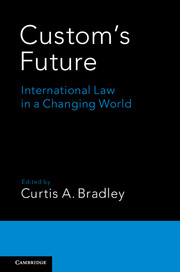Book contents
- Frontmatter
- Dedication
- Contents
- Notes on Contributors
- Introduction: Custom's Future
- 1 Custom's Past
- 2 Customary International Law Adjudication as Common Law Adjudication
- 3 Customary International Law as a Dynamic Process
- 4 Custom, Jus Cogens, and Human Rights
- 5 Customary International Law: How Do Courts Do It?
- 6 Custom's Method and Process: Lessons from Humanitarian Law
- 7 The Growing Obsolescence of Customary International Law
- 8 The Strange Vitality of Custom in the International Protection of Contracts, Property, and Commerce
- 9 The Decline of Customary International Law as a Source of International Criminal Law
- 10 Customary International Law and Public Goods
- 11 Reinvigorating Customary International Law
- 12 The Evolution of Codification: A Principal-Agent Theory of the International Law Commission's Influence
- 13 Custom and Informal International Lawmaking
- 14 Custom's Bright Future: The Continuing Importance of Customary International Law
- Bibliography
- Index
14 - Custom's Bright Future: The Continuing Importance of Customary International Law
Published online by Cambridge University Press: 05 February 2016
- Frontmatter
- Dedication
- Contents
- Notes on Contributors
- Introduction: Custom's Future
- 1 Custom's Past
- 2 Customary International Law Adjudication as Common Law Adjudication
- 3 Customary International Law as a Dynamic Process
- 4 Custom, Jus Cogens, and Human Rights
- 5 Customary International Law: How Do Courts Do It?
- 6 Custom's Method and Process: Lessons from Humanitarian Law
- 7 The Growing Obsolescence of Customary International Law
- 8 The Strange Vitality of Custom in the International Protection of Contracts, Property, and Commerce
- 9 The Decline of Customary International Law as a Source of International Criminal Law
- 10 Customary International Law and Public Goods
- 11 Reinvigorating Customary International Law
- 12 The Evolution of Codification: A Principal-Agent Theory of the International Law Commission's Influence
- 13 Custom and Informal International Lawmaking
- 14 Custom's Bright Future: The Continuing Importance of Customary International Law
- Bibliography
- Index
Summary
The conference leading to the present volume was entitled “Custom in Crisis: International Law in a Changing World.” That was also the original working title for the volume; it was suggested that customary international law was reaching a crisis point given contemporary challenges exacerbated by continuing uncertainty surrounding its nature and function, and that in these circumstances there was much controversy with respect to both the content of customary rules and the processes by which they evolve and are ascertained. While the title eventually chosen for the book is more neutral about the future of customary international law and does not strike such an alarming note, at least some of the contributors continue to question custom's role and relevance, treating it as a source of law plagued with difficulties and having only limited utility. It is argued, for example, that customary international law is by now mostly obsolete or at the very least in need of “reinvigoration”; that its nature “remains stubbornly opaque or conceptually problematic”; and that its vitality (in the international protection of contracts, property, and commerce) is “strange,” and its role (as a source of international criminal law) “declining.”
Such a bleak outlook, we would argue, does not correspond to reality: in fact, customary international law has probably never been in better shape. Not only is it not in crisis in this (ever-)changing world in which it has to operate, but its role in the international legal system continues to be fundamental. Furthermore, recognition of its significance and confidence in its operation are evident in the recent work of the International Law Commission on the topic “Identification of customary international law.” While academic disputes surrounding the nature and function of custom may indeed endure, in practice some long-standing questions have by now been settled, and others do not prevent custom from continuing to play an important role as positive international law in force.
QUESTIONING CUSTOM
Custom's prominent position in the international legal system has not gone unchallenged in the modern era. The oldest source of international law has been subjected to several acute challenges, each of which was explicitly aimed at reducing its influence. For a start, the codification movement dating from the nineteenth century attached much importance to replacing customary international law by lex scripta.
- Type
- Chapter
- Information
- Custom's FutureInternational Law in a Changing World, pp. 360 - 370Publisher: Cambridge University PressPrint publication year: 2016

